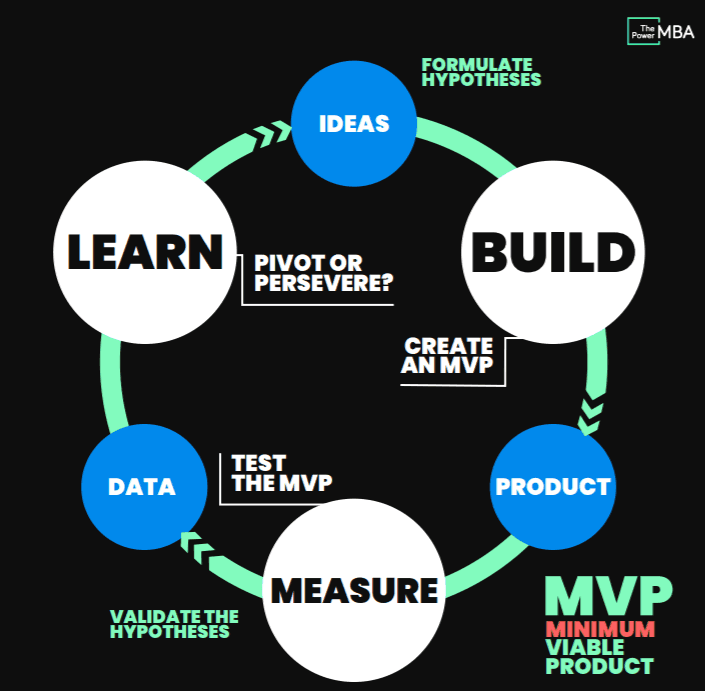7 Must-Read Books For Entrepreneurs Wanting to Get Ahead

Franco Brutti
Quickly glancing across the web, you can find any number of posts listing must-read books for entrepreneurs.
However, after scrolling through it can start to feel overwhelming.
Out of the 20, 30, 40+ books, which should I buy first? Why have you tipped up this one? And how will it help?
This isn’t to knock those posts by any means. Many of those lists contain some cracking entrepreneur books that, given the time, definitely warrant a check-out from your local library.
But for me, that was the issue - time.
Because so few of us have the time to rattle off 40+ books…
I thought what’s missing is a select list. If someone “gun to head” had to pick out say 7, what would they be? And more importantly, why?
So, after careful deliberation with the staff here at ThePowerMBA, we did just that.
We picked out 7 must-read books for entrepreneurs.
We feel it offers a great balance of practical advice, insight, and strategy from people to have already walked the entrepreneurial path, and faced down its many challenges.
Some dedicated reading time to this list will surely see you emerge a wiser entrepreneur - no matter your prior experience.
Because in our opinion, you are never too old to stop learning!
Blue Ocean Strategy

Look around the majority of businesses in your sector.
Do you think it’s fair to say pretty much all sell the same products, to the same target audience, via the same distribution channels?
They’re like sheep grazing in a paddock.
Munching on the same grass, sporting the same woolly coats, and generally just following the herd’s general direction.
🥱
But what if you could innovate your business, and become a black sheep among the sea of white?
What if you could find a way to stand out? To truly differentiate in areas other than price point and quality?
Well, that’s exactly what Renee Mauborgne and W. Chan Kim thought.
In fact, they were so taken by the idea they wrote a book on it - Blue Ocean Strategy: How to Create Uncontested Market Space and Make Competition Irrelevant.
And what a book it is!
It truly gets you to rethink not just how your company works, but the industry as a whole.
It does this by placing the customer at the center of everything. This forces you to rethink the entire value innovation concept:
“Value innovation is about creating more value for customers while simultaneously reducing costs”
You’ll find that after reading the book, after using the tools provided, you’ll be able to approach the customer problem from a completely different angle.
An angle that none of your competitors have even thought about.
Do this, and you’ll make your competition irrelevant.

This is why we not only cover it in our online business program but also wrote a step-by-step guide on Blue Ocean Strategy.
That’s how strongly we feel about it, and that’s why it’s top of our list of must-read books for entrepreneurs.
The Lean Startup, by Eric Ries

So, you’ve got a business idea you’d like to develop.
You’re fairly sure the market will take to it and you have the necessary resources to make it work. So your next step is to validate it.
In The Lean Startup, author Eric Ries teaches you how to do just that.
His process also ensures you do so without investing too much time or money. Helping you to avoid unnecessary risk as an entrepreneur…
So, how does it work?
The entire concept is built around his build-measure-learn feedback loop:

Instead of making assumptions about how a market will react to your product, build a prototype, and actually test it.
This way you constantly adjust and improve your product based on feedback from your first clients, while drastically reducing the time taken to get the product to market.
Of course, this is a seriously “lean” explanation and the book goes into a lot more detail (of which we highly recommend you go pick up a copy) 😉
In fact, Eric teaches an entire module of our online business program solely around this topic.
And it’s by far one of the most popular among our students:
https://vimeo.com/442716166/fc033c0258
How to Win Friends and Influence People, by Dale Carnegie

As an entrepreneur, you’re going to be dealing directly with people on a daily basis.
Whether that’s speaking with clients, internal staff, agents, contractors, potential investors - that’s a lot of conversations with a lot of different people.
And while it might seem trivial, the “art” of good conversation is in fact a difficult skill to learn. One that certainly doesn’t come easy to all.
So what Carnegie’s How to Win Friends and Influence Them does is navigate you around the gallery.
It teaches you how to communicate depending on the relationship you have with that person, making it our favorite book covering business psychology.
An area perhaps often overlooked by budding entrepreneurs!
A standout example for me was the simple gesture of wishing someone a happy birthday.
Think about it for a second. It feels good, doesn’t it, when someone remembers your birthday and makes the effort to reach out.
Especially if it’s coming from someone outside of your close circle of friends and family. Someone you wouldn’t perhaps expect it from.
Small gestures such as these go a long way to building relationships as an entrepreneur.
Building A Story Brand, by Donald Miller

Think about the last movie you saw.
It probably revolved around a main character or protagonist. This character likely faced a challenge or problem that needed solving. However, they were unable to do it alone. They needed help and support from a guide. This guide gave them a plan, called them to action, ensured they avoided failure and ultimately, achieved success…
The end.
Sounds like a pretty standard story arc, right?
What Donald Miller proposes in his book Building a Story Brand is to implement this 7-step Storybrand Barandscript framework for your own brand.
Customers are continually looking for solutions to their problems. Google, Firefox, YouTube, Bing, and all the other search engines out there is a testament to that fact.
By replacing the main character with your customer and the guide with your brand, it can be you that empathizes with their situation and takes them along this journey for answers.
So, why do we recommend this framework for entrepreneurs?
The answer is threefold:
It allows you to simplify your messaging
Connect with customers
Grow your business
The book is packed full of resources to help you better understand the concept and how specifically to adapt it to your business.
Go grab yourself a copy!
Start With Why, by Simon Sinek
Why is it, do you think, that some organizations are able to inspire, lead, and transform industries and sectors where others don’t?
Is it about funding? Luck? Or just sheer determination?
Simon Sinek has an alternative theory.
In his book Start With Why, Sinek argues that inspired leaders (regardless of background, industry, or funding) always think from the inside out.
They understand WHY they exist, what’s their purpose, what’s their core mission, and place this at the center of everything they do.
He argues that most companies have got it backward, focusing too much on the WHAT they sell, and HOW it works.
But in reality…
“People don’t buy what you do, they buy why you do it” - Simon Sinek
He uses his The Golden Circle diagram through the book to explain his idea:

With examples from the likes of Steve Jobs, what made him a great leader, Apple, and why customers always return to purchase their products.
It’s a fantastic read for entrepreneurs as it really forces you to rethink your messaging, and teaches you to put the core values, beliefs, purpose at the center of everything.
https://www.ted.com/talks/simon_sinek_how_great_leaders_inspire_action#t-325016
SPIN Selling, by Neil Rackham

No matter how great your product, service, or idea is, if you’re unable to market and ultimately sell it, the business will fail.
This is especially true today where customers can choose from thousands of alternative products. If entrepreneurs are to succeed they must understand how to sell.
If dealing in large, multi-faceted sales cycles, one of the best books you can buy is Neil Rackham’s SPIN Selling.
Rackham analyzed over 35,000 sales calls from seasoned sales professionals to determine what worked, and what didn’t.
His study revealed that…
“The quality of the questions asked by the salesperson directly impacted higher closing rates.”
In shorter, consumer goods sales cycles a close can often be completed over a single call.
However, when dealing with much longer, complex deals it’s not so much about the product as it is about growing relationships, demonstrating empathy, and building trust.
This is achieved by asking questions in sequential “SPIN” order:
Situation: understand the context of the sale
Problems: identify customer’s problems
Implications: what happens if they don’t act?
Need-Payoff: customer ends up explaining how the solution benefits them
While it might seem overwhelming for those new to sales, Rackham does a great job of breaking steps down into bite-size pieces.
Each concept is explained using real case studies, as well as practical advice on how to prepare for the four outcomes of any sales call and which questions to ask in what order.
This method essentially teaches entrepreneurs to identify customer pain points and not push random solutions. If there’s no identifiable pain point, there’s no sale.
If you continue to find solvable problems, then you have to learn to pivot (as you may remember from our look at the Lean Startup earlier), as your initial hypothesis is likely incorrect.
Essentialism: The Disciplined Pursuit of Less, by Greg McKeown

The final book we wanted to add to this list is Essentialism: The Disciplined Pursuit of Less, by Greg McKeown.
As an entrepreneur, your life is hectic.
To make the business a success you have to learn:
A new set of skills
Monitor the competition
Speak to clients
Read endless books
Learn to negotiate
Manage, and sell your product
...all while balancing family life (and trying to remain fit and healthy).
The problem is there’s simply not enough time to fit all that in. You must learn how to prioritize your time.
This book challenges you to do just that!
To step back and think about what it is your spending your time on.
What are your strengths? Where will you make the biggest difference? What areas can you delegate to other members of your team?
A quote that stood out to me from the book is:
“Warren Buffett owes 90% of his wealth to just ten investments.”
Less is often more, as McKeown hammers home hard throughout the book. Something we think all entrepreneurs can learn from.
We want to hear from you!
What books do you think every entrepreneur should read? What do you think of the 7 we’ve chosen?
Looking for something specific?






